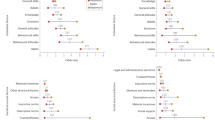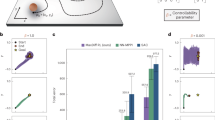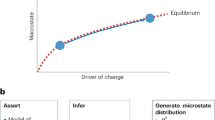Abstract
In virtually all human societies, the sustained provision of public goods is enforced through punishment. This can happen, for example, via a legal system (formal punishment institutions) or individual-level reciprocity (informal punishment institutions). However, targeting and enforcement of punishment is usually costly, leaving a permanent temptation for individuals to avoid the costs. Here, we show that costly punishment institutions can be adopted through voting and learning but suffer an existential threat if the decision-making process to implement the punishment institution is not aligned with the scale of the public good, creating unavoidable free-riding incentives. We design a model where individuals vote in favour of or against the institution, either with their feet or group vote, to govern public goods at different scales. Learning occurs through the accumulation of one’s experiences and observations of other members in the population, but it may be limited due to memory and information constraints. We show—across scales of the decision-making process and public good—under which conditions punishment institutions are adopted and promote cooperation. Using a meta-study approach, we compare the model to existing experimental results, which largely confirm the key results of the model.
This is a preview of subscription content, access via your institution
Access options
Access Nature and 54 other Nature Portfolio journals
Get Nature+, our best-value online-access subscription
$29.99 / 30 days
cancel any time
Subscribe to this journal
Receive 12 digital issues and online access to articles
$119.00 per year
only $9.92 per issue
Buy this article
- Purchase on Springer Link
- Instant access to full article PDF
Prices may be subject to local taxes which are calculated during checkout




Similar content being viewed by others
Data availability
Data sources for experimental results are detailed in Supplementary Section F.
Code availability
Pseudocode for the computational model is available in Supplementary Section A. Code for the simulations is available in the GitHub repository: https://github.com/vvvasconcelos/multiscale-public-goods-and-institutions-with-voting-and-learning.
References
Henrich, J. et al. Costly punishment across human societies. Science https://doi.org/10.1126/science.1127333 (2006).
Ostrom, E. Governing the Commons: The Evolution of Institutions for Collective Action (Cambridge University Press, 1990).
Ostrom, E., Walker, J. & Gardner, R. Covenants with and without a sword: self-governance is possible. Am. Polit. Sci. Rev. 86, 404–417 (1992).
Fehr, E. & Gächter, S. Cooperation and punishment in public goods experiments. Am. Econ. Rev. 90, 980–994 (2000).
Dreber, A., Rand, D. G., Fudenberg, D. & Nowak, M. A. Winners don’t punish. Nature https://doi.org/10.1038/nature06723 (2008).
Rand, D. G., Ohtsuki, H. & Nowak, M. A. Direct reciprocity with costly punishment: generous tit-for-tat prevails. J. Theor. Biol. https://doi.org/10.1016/j.jtbi.2008.09.015 (2009).
Ohtsuki, H., Iwasa, Y. & Nowak, M. A. Indirect reciprocity provides only a narrow margin of efficiency for costly punishment. Nature https://doi.org/10.1038/nature07601 (2009).
Sethi, R. & Somanathan, E. Understanding reciprocity. J. Econ. Behav. Organ. 50, 1–27 (2003).
Bowles, S. & Gintis, H. A Cooperative Species (Princeton Univ. Press, 2011).
Hauert, C., Traulsen, A., Brandt, H., Nowak, M. A. & Sigmund, K. Via freedom to coercion: the emergence of costly punishment. Science https://doi.org/10.1126/science.1141588 (2007).
Brandt, H., Hauert, C. & Sigmund, K. Punishment and reputation in spatial public goods games. Proc. R. Soc. B https://doi.org/10.1098/rspb.2003.2336 (2003).
Helbing, D., Szolnoki, A., Perc, M. & Szabó, G. Evolutionary establishment of moral and double moral standards through spatial interactions. PLoS Comput. Biol. https://doi.org/10.1371/journal.pcbi.1000758 (2010).
Helbing, D., Szolnoki, A., Perc, M. & Szabó, G. Punish, but not too hard: how costly punishment spreads in the spatial public goods game. New J. Phys. https://doi.org/10.1088/1367-2630/12/8/083005 (2010).
Perc, M. & Szolnoki, A. Self-organization of punishment in structured populations. New J. Phys. https://doi.org/10.1088/1367-2630/14/4/043013 (2012).
Boyd, R., Gintis, H. & Bowles, S. Coordinated punishment of defectors sustains cooperation and can proliferate when rare. Science https://doi.org/10.1126/science.1183665 (2010).
Sigmund, K., De Silva, H., Traulsen, A. & Hauert, C. Social learning promotes institutions for governing the commons. Nature 466, 861–863 (2010).
Hilbe, C., Traulsen, A., Röhl, T. & Milinski, M. Democratic decisions establish stable authorities that overcome the paradox of second-order punishment. Proc. Natl Acad. Sci. USA 111, 752–756 (2014).
Murphy, B. The Punisher’s Brain: The Evolution of Judge and Jury. By Hoffman, Morris B. Pp. xi, 359. Cambridge/NY, Cambridge University Press, 2014, £21.99/$30.00. Heythrop J. https://doi.org/10.1111/heyj.12249_81 (2015).
Gruter, M. & Masters, R. D. Ostracism as a social and biological phenomenon: an introduction. Ethol. Sociobiolo. https://doi.org/10.1016/0162-3095(86)90043-9 (1986).
Molleman, L., Kölle, F., Starmer, C. & Gächter, S. People prefer coordinated punishment in cooperative interactions. Nat. Hum. Behav. https://doi.org/10.1038/s41562-019-0707-2 (2019).
Szolnoki, A., Szabó, G. & Perc, M. Phase diagrams for the spatial public goods game with pool punishment. Phys. Rev. E https://doi.org/10.1103/PhysRevE.83.036101 (2011).
Ostrom, E. Collective action and the evolution of social norms. J. Econ. Perspect. 14, 137–158 (2000).
Platteau, J.-P. Institutions, Social Norms, and Economic Development Vol. 1 (Psychology Press, 2000).
van den Bergh, J. C. J. M., Ferrer-i-Carbonell, A. & Munda, G. Alternative models of individual behaviour and implications for environmental policy. Ecol. Econ. 32, 43–61 (2000).
Traulsen, A., Nowak, M. A. & Pacheco, J. M. Stochastic dynamics of invasion and fixation. Phys. Rev. E 74, 11909 (2006).
Dequech, D. Institutions, social norms, and decision-theoretic norms. J. Econ. Behav. Organ. 72, 70–78 (2009).
Dunn, S. P. Bounded rationality is not fundamental uncertainty: a post Keynesian perspective. J. Post Keynes. Econ. 23, 567–587 (2001).
Levin, S. The trouble of discounting tomorrow. Solutions 3, 20–24 (2012).
Alford, R. P. The proliferation of international courts and tribunals: international adjudication in ascendance. In Proc. Annual Meeting of the American Society of International Law Vol. 94, 160–165 (Cambridge University Press, 2000).
Dunn, L. A. Containing Nuclear Proliferation (International Institute for Strategic Studies, 1991).
Potoski, M. Green clubs in building block climate change regimes. Climatic Change 144, 53–63 (2017).
Trzyna, T. C., Margold, E. & Osborn, J. K. World Directory of Environmental Organizations: A Handbook of National and International Organizations and Programs—Governmental and Non-governmental—Concerned with Protecting the Earth’s Resources Vol. 5 (Earthscan, 1996).
Dixit, A. & Levin, S. in The Theory of Externalities and Public Goods: Essays in Memory of Richard C. Cornes (eds Buchholz, W. and Rübbelke, D.) 127–143 (Springer, 2017); https://doi.org/10.1007/978-3-319-49442-5_7
Vasconcelos, V. V., Santos, F. C. & Pacheco, J. M. A bottom-up institutional approach to cooperative governance of risky commons. Nat. Clim. Change 3, 797–801 (2013).
Vasconcelos, V. V., Santos, F. C. & Pacheco, J. M. Cooperation dynamics of polycentric climate governance. Math. Model. Methods Appl. Sci. 25, 2503–2517 (2015).
Ostrom, E. Beyond markets and states: polycentric governance of complex economic systems. Am. Econ. Rev. 100, 641–672 (2010).
Vasconcelos, V. V., Hannam, P. M., Levin, S. A. & Pacheco, J. M. Coalition-structured governance improves cooperation to provide public goods. Sci. Rep. 10, 9194 (2020).
Nyborg, K. et al. Social norms as solutions. Science 354, 42–43 (2016).
Hannam, P. M., Vasconcelos, V. V., Levin, S. A. & Pacheco, J. M. Incomplete cooperation and co-benefits: deepening climate cooperation with a proliferation of small agreements. Climatic Change 144, 65–79 (2017).
Markussen, T., Putterman, L. & Tyran, J.-R. Self-organization for collective action: an experimental study of voting on sanction regimes. Rev. Econ. Stud. 81, 301–324 (2014).
Gürerk, Ö., Irlenbusch, B. & Rockenbach, B. The competitive advantage of sanctioning institutions. Science 312, 108–111 (2006).
Dannenberg, A. & Gallier, C. The choice of institutions to solve cooperation problems: a survey of experimental research. Exp. Econ. https://doi.org/10.1007/s10683-019-09629-8 (2019).
Bühren, C. & Dannenberg, A. The demand for punishment to promote cooperation among like-minded people. Eur. Econ. Rev. 138, 103862 (2021).
Radzvilavicius, A. L., Kessinger, T. A. & Plotkin, J. B. Adherence to public institutions that foster cooperation. Nat. Commun. 12, 3567 (2021).
Acknowledgements
V.V.V. acknowledges funds from the Princeton Institute for International and Regional Studies, through the Rapid Switch Initiative. V.V.V. and S.A.L. acknowledge funding from the US Defense Advanced Research Projects Agency (D17AC00005) and National Science Foundation grant GEO-1211972. A.D. acknowledges funding from the European Union (EU) Horizon 2020 programme, action ERC-2014-STG, Project HUCO, grant number 636746.
Author information
Authors and Affiliations
Contributions
V.V.V, A.D. and S.A.L. discussed the design, analysis and results. A.D. compiled the experimental results data. V.V.V. designed and analysed the model and data. V.V.V. and A.D. wrote the paper.
Corresponding author
Ethics declarations
Competing interests
The authors declare no competing interests.
Peer review
Peer review information
Nature Sustainability thanks the anonymous reviewers for their contribution to the peer review of this work.
Additional information
Publisher’s note Springer Nature remains neutral with regard to jurisdictional claims in published maps and institutional affiliations.
Supplementary information
Supplementary information
Supplementary Sections A–F.
Rights and permissions
About this article
Cite this article
Vasconcelos, V.V., Dannenberg, A. & Levin, S.A. Punishment institutions selected and sustained through voting and learning. Nat Sustain 5, 578–585 (2022). https://doi.org/10.1038/s41893-022-00877-w
Received:
Accepted:
Published:
Issue Date:
DOI: https://doi.org/10.1038/s41893-022-00877-w
This article is cited by
-
Discipline and punishment in panoptical public goods games
Scientific Reports (2024)



